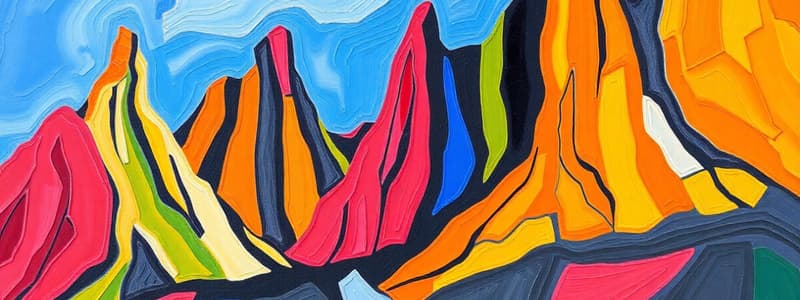Podcast
Questions and Answers
What is the main force responsible for the formation of flood plains?
What is the main force responsible for the formation of flood plains?
- Deposition of sediments by rivers (correct)
- Erosion caused by rivers
- The force of gravity
- The movement of tectonic plates
Which of the following is NOT an erosional feature of sea waves?
Which of the following is NOT an erosional feature of sea waves?
- Stacks
- Sea cliffs
- Sand dunes (correct)
- Sea caves
Which of these landforms is MOST LIKELY to be found in a desert environment?
Which of these landforms is MOST LIKELY to be found in a desert environment?
- Sand dunes (correct)
- Oxbow lakes
- Waterfalls
- Flood plains
Which of the following is the correct sequence of landforms created by the erosive action of a river?
Which of the following is the correct sequence of landforms created by the erosive action of a river?
Which of these is a depositional feature resulting from the work of glaciers?
Which of these is a depositional feature resulting from the work of glaciers?
Flashcards
Why do tectonic plates move?
Why do tectonic plates move?
The movement of tectonic plates is driven by convection currents within the Earth's mantle. Heat from the Earth's core causes the mantle to circulate, pulling the plates along with it.
What are exogenic and endogenic forces?
What are exogenic and endogenic forces?
Exogenic forces are external forces that shape the Earth's surface, like weathering and erosion. Endogenic forces are internal forces, such as volcanic activity and earthquakes, which create new landforms.
What is erosion?
What is erosion?
Erosion is the process of wearing away and transporting rock and soil by natural forces like wind, water, and ice. It sculpts mountains, valleys, and coastlines.
How are flood plains formed?
How are flood plains formed?
Signup and view all the flashcards
What are sand dunes?
What are sand dunes?
Signup and view all the flashcards
Study Notes
Lithospheric Plates and Earth Movements
- The lithosphere is divided into plates
- These plates move slowly, a few millimeters per year
- Movement is caused by molten magma flowing in a circular pattern within the Earth
- Plate movement causes changes on the Earth's surface
Endogenic and Exogenic Forces
- Forces that act inside the Earth are called endogenic forces
- Forces that work on the Earth's surface are called exogenic forces
- Endogenic forces can cause sudden or slow movements
- Examples of sudden movements are earthquakes and volcanoes, causing significant destruction
- Examples of slow movements are gradual changes in landforms
Volcanoes
- A volcano is an opening in the Earth's crust
- Molten material erupts suddenly through this opening (vent)
- Molten material (magma) travels from a chamber under the Earth's surface, to the surface
Earthquakes
- Earthquakes are vibrations on the Earth's surface
- They start at the focus (origin) deep within the Earth's crust
- These vibrations spread outwards as waves, originating at the epicenter (the point on the surface directly above the focus)
- Earthquakes can be measured on the Richter scale
Weathering and Erosion
- Weathering is the breaking down of rocks on the Earth's surface
- Erosion is the wearing away of the landscape by factors like wind, water, and ice
- Erosion and deposition create varied landforms on the Earth's surface
Work of a River
- Rivers erode the landscape as they flow
- Rivers carve valleys and create waterfalls around obstacles
- As rivers meander through plains, they form meanders
- In time, meanders can cut off and form oxbow lakes
- Rivers can deposit sediments, forming floodplains
Work of Sea Waves
- Sea waves continuously strike coastal landforms
- Rocks are eroded, forming cracks and cavities, creating caves and arches
- Deposition of sediments by waves creates beaches.
- Stacks and sea cliffs are other features formed by waves
Work of Ice (Glaciers)
- Glaciers erode the landscape by bulldozing soil and rocks
- They create hollows that eventually may fill with water, forming lakes
- Sediments (debris), rocks, sand and silt are deposited from melting glaciers, forming moraines
Work of Wind
- Wind is an agent of erosion and deposition in deserts
- Wind can shape rocks into mushroom forms (mushroom rocks)
- Wind carries fine sand grains, depositing them in large areas as loess
- Wind also creates sand dunes
Studying That Suits You
Use AI to generate personalized quizzes and flashcards to suit your learning preferences.
Related Documents
Description
Test your knowledge on various geographical landforms and the processes that create them. This quiz will challenge your understanding of flood plains, erosional features of sea waves, and more. Perfect for students exploring Earth Science concepts.



